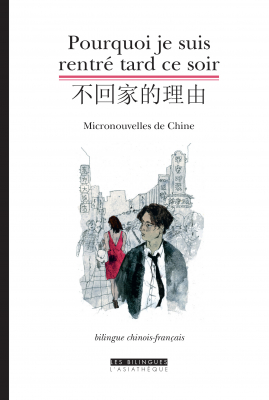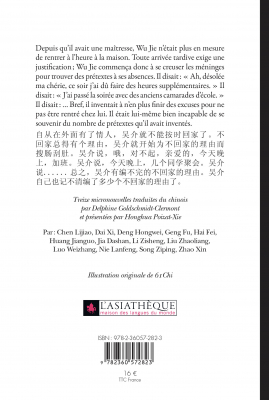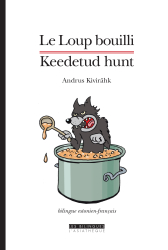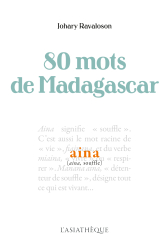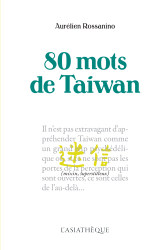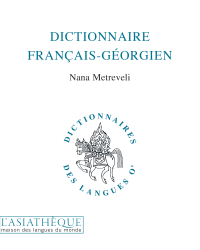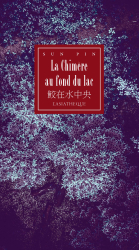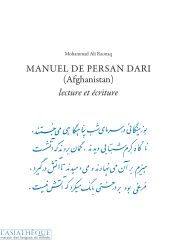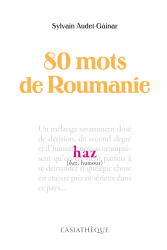Details
Format: Paperback
ISBN: 9782360572823
Collection: Les bilingues
12.1 x 18 cm
Weight: 148 gr
Pages: 160
First publication: 21/04/2021
Last printing: 07/2023
CLIL: 3621, 4033
Pourquoi je suis rentré tard ce soir
(Why I came back late tonight)
Micronouvelles de Chine
(Micro-short stories from China)
bilingual Chinese – French
Translation: Delphine Goldschmidt-Clermont
Preface : Honghua Poizat-Xie
Discovering an original aspect of Chinese literature today: micro-shortstories - small masterpieces of conciseness and delicacy.
The micro-short stories
The phenomenon of micro-short stories as it presents itself in China with the extraordinary development of the genre over the past forty years is unique in the world. In addition to favorable political, economic, social and cultural conditions, the emergence of the Internet, social networks and cell phone reading software has greatly stimulated the transmission and reading of concise texts. Not only are these tools particularly suited to the dissemination of this literature, but they also make the authors of these texts autonomous, independent and free from the constraints of traditional publication by publishers or booksellers.
The book
Thirteen micro-short stories from contemporary authors from mainland China were selected for this collection. Their authors enjoy national recognition and have often won awards. These texts were chosen primarily for their intrinsic literary interest. We notice the art of sketching the character(s) all at once in a limited space. The story is short but often with unexpected and even surprising twists. Through these sketches, readers can get to know different aspects of daily life in contemporary China. The thirteen paintings on display reflect the diversity of Chinese society: city and countryside, tradition and modernity, migration, political power and bureaucracy, but also social, intergenerational, family, love relationships, etc. The tone and style of the texts offered are also varied, from humor to nostalgia. This collection is ideal for readers who want to discover China through a new literary genre. It is also for Chinese teachers who can use it as teaching material, as well as for students whose level of Chinese is not yet fluent enough to read long texts.
CONTRIBUTORS' BIOGRAPHIES
Delphine Goldschmidt-Clermont
Delphine Goldschmidt-Clermont holds a master's degree in Asian studies from the University of Geneva. Employed at the Faculty of Letters of the University of Geneva, she also pursues her activity as a translator, which has been distinguished in several international competitions. She was notably a winner in the 2019 literary translation competition of the Confucius Institute of Geneva for Qin Delong's micro-short story: "Climbing the ladder". She is one of the authors of Lexique du chinois contemporain, published at l'Asiathèque in 2013.
Honghua Poizat-Xie
Honghua Poizat-Xie teaches Chinese language and literature at the University of Geneva. She is also the author of a series of Chinese learning books at L'Asiathèque.
TABLE OF CONTENTS
Introduction : Les micronouvelles, miroir de la société chinoise contemporaine, par Honghua Poizat-Xie (Introduction: Micronews, mirror of contemporary Chinese society, by Honghua Poizat-Xie)
Jia Dashan (贾大山)
莲池老人 Étang-des-lotus
La grande sagesse du vieux Lianchi (« Étang-des-lotus »), le gardien de la cloche de bronze du sanctuaire. (Jia Dashan (贾大山) 莲池老人 Lotus-pond The great wisdom of old Lianchi ("Pond-of-lotus"), the keeper of the shrine's bronze bell.)
Huang Jianguo (黄建国)
谁先看见村庄 Qui de nous deux verra le village la première ?
Sur le point de gagner leur village pour le nouvel an, deux jeunes femmes s’interrogent sur leur maquillage. Quel accueil leur sera-t-il réservé ? (Huang Jianguo (黄建国) 谁先看见村庄 Which of us will see the village first? About to reach their village for the New Year, two young women wonder about their make-up. How will they be received?)
Luo Weizhang (罗伟章)
蒙面人 L’homme masqué
Un jeune homme devient le colocataire d’un scénariste à succès. Il lui révèle que son rêve est de devenir acteur. Attendri par cette confidence, le scénariste ajoute dans son scénario les scènes aquatiques où le jeune homme pense pouvoir exceller. (Luo Weizhang (罗伟章) 蒙面人 The Masked Man A young man becomes the roommate of a successful screenwriter. He tells her that his dream is to become an actor. Touched by this confidence, the scriptwriter adds in his scenario the aquatic scenes where the young man thinks he can excel.)
Hai Fei (海飞)
走失的黑猫 Un chat noir perdu
Répondant à l’annonce d’une vieille dame cherchant son chat perdu, une bande de jeunes gens pense profiter de l’occasion pour profiter des largesses de la dame en lui amenant un chat de rencontre. La suite sera inattendue. (Hai Fei (海飞) 走失的黑猫 A Lost Black Cat Responding to the announcement of an old lady looking for her lost cat, a group of young people think of taking the opportunity to take advantage of the largesse of the lady by bringing her a meeting cat. The sequel will be unexpected.)
Zhao Xin (赵新)
念想 Un souvenir
M. Zhou, le maire de la commune tombe, au cours d’une promenade, sur un verger de jujubiers. Ne pouvant résister à la tentation, il en fourre une bonne quantité dans sa poche et est surpris par le propriétaire qui le met à l’amende. Moment épineux qui oblige le notable à réfléchir sur lui-même. (Zhao Xin (赵新) 念想 A memory Mr. Zhou, the mayor of the commune, comes across an orchard of jujube trees during a walk. Unable to resist the temptation, he stuffs a good quantity in his pocket and is surprised by the owner who fines him. Thorny moment that forces the notable to reflect on himself.)
Dai Xi (戴希)
羊吃什么 Ce que mangent mes moutons
Un éleveur de moutons est en butte aux tracasseries et à la vénalité d’une série de fonctionnaires qui ne cessent de lui infliger des amendes. Le seul moyen de leur échapper est de leur clouer le bec par l’absurdité de ses réponses. (Dai Xi (戴希) 羊吃什么 What my sheep eat A sheep farmer is the target of harassment and venality from a series of officials who keep fining him. The only way to escape them is to shut them down by the absurdity of his answers.)
Nie Lanfeng (聂兰锋)
一件皮袄的折磨 Les tourments nés d’une veste fourrée
« Quand elle aura grandi, elle n’aura qu’à m’offrir une veste fourrée. » Telle est la petite phrase que lance l’oncle d’une enfant qu’il a conduite d’urgence à l’hôpital à la mère pleine de gratitude. Cette petite phrase va se révéler plus lourde qu’on ne le pense. (Nie Lanfeng (聂兰锋) 一件皮袄的折磨 The torments born of a lined jacket “When she grows up, she will only have to offer me a lined jacket. This is the little phrase launched by the uncle of a child he rushed to the hospital to the grateful mother. This little sentence will turn out to be heavier than you think.)
Liu Zhaoliang (刘兆亮)
青岛啊,青岛 Ah, Qingdao !
Le héros du récit rêve de la ville de Qingdao depuis que son père y est parti pour gagner sa vie. Pour le père, la réalité est amère. Trompé par un entrepreneur escroc, il rentre à la maison une malheureuse pièce de 3 mao en poche tandis que son fils part à son tour, admis à l’université de Qingdao. (Liu Zhaoliang (刘兆亮) 青岛啊,青岛 Ah, Qingdao! The hero of the story dreams of the city of Qingdao since his father left there to earn his living. For the father, the reality is bitter. Deceived by a crooked entrepreneur, he comes home with an unfortunate 3 Mao coin in his pocket while his son leaves in turn, admitted to Qingdao University.)
Geng Fu (更夫)
鹰唱 Le chant du faucon
Un jeune photographe se rend dans une région montagneuse pour y photographier des faucons. Il rencontre un groupe de mineurs et l’un d’entre eux lui raconte comment, dans certaines circonstances, les faucons chantent. S’agit-il d’implorer le ciel pour rester en vie ? (Geng Fu (更夫) 鹰唱 The Falcon's Song A young photographer travels to a mountainous region to photograph falcons. He meets a group of miners and one of them tells him how, under certain circumstances, hawks sing. Is it imploring the sky to stay alive?)
Chen Lijiao (陈力娇)
化简程序 Le Boddhisattva de la Vérité
L’héroïne du récit demande au directeur Wu, son frère, surnommé le « Bodhisattva de la Vérité », de donner un coup de main à son amoureux qui cherche du travail. Elle s’étonne que son frère ne fasse rien. La suite lui révélera en quoi le surnom du frère est justifié. (Chen Lijiao (陈力娇) 化简程序 The Bodhisattva of Truth The heroine of the story asks the director Wu, her brother, nicknamed the "Bodhisattva of Truth", to give a hand to her lover who is looking for work. She is surprised that her brother does nothing. The sequel will reveal to him how the nickname of the brother is justified.)
Song Ziping (宋子平)
遗失 Perdue
Une jeune femme va-t-elle rejoindre l’homme qu’elle aime ou non. Elle va à la gare, essaie de lui téléphoner, monte dans un train, est-ce pour aller vers lui ou pour rentrer chez elle ? Il suffit de mille choses infinitésimales pour que le destin change. (Song Ziping (宋子平) Lost 遗失 Will a young woman join the man she loves or not. She goes to the station, tries to phone him, gets on a train, is it to go to him or to go home? It only takes a thousand infinitesimal things for fate to change.)
Li Zisheng (李子胜)
大侠 Le Justicier
Un journaliste débutant est en visite chez le vieux « Justicier Gu » et celui-ci lui raconte d’où lui vient ce nom. Le vieil homme adore se remémorer ses faits d’arme de l’époque de l’Armée de Libération et fatigue tout le monde avec ses récits jusqu’au jour où il trouve son public : des écoliers qu’il fait rêver. (Li Zisheng (李子胜) 大侠 The Justice A rookie journalist is visiting the old "Justicier Gu" and he tells him where his name comes from. The old man loves to remember his feats of arms from the time of the Liberation Army and tires everyone with his stories until the day he finds his audience: schoolchildren he makes dream.)
Deng Hongwei (邓洪卫)
不回家的理由 Pourquoi je suis rentré tard ce soir
Quand il s’attarde le soir avec sa maîtresse, Wu Je prend soin de trouver des prétextes, et ça marche. Mais un soir la machine se dérègle, la maîtresse se fâche, Wu Je rentre plus tôt chez lui, et là rien ne va plus. (Deng Hongwei (邓洪卫) 不回家的理由 Why I came home late tonight When he lingers in the evening with his mistress, Wu Je takes care to find excuses, and it works. But one evening the machine goes wrong, the mistress gets angry, Wu I go home early, and then nothing goes.)
